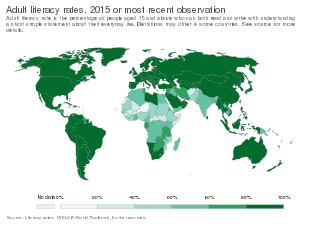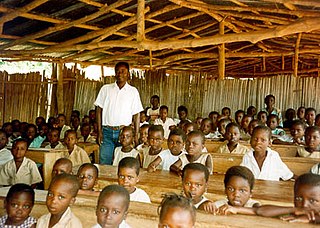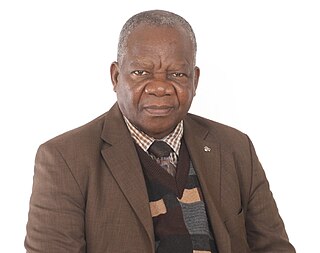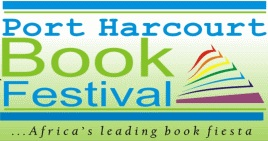The following table presents a listing of Nigeria's 36 states and the Federal Capital Territory ranked by their literacy rate
The following table presents a listing of Nigeria's 36 states and the Federal Capital Territory ranked by their literacy rate
Literacy rate of the population over 6 according to data by the UNESCO. [1] [ dead link ]
| Rank | State | literacy rate (in %) |
|---|---|---|
| 1 | Lagos State | 92.1 |
| 2 | Ekiti State | 80.0 |
| 3 | Ondo state | 75.1 |
| 4 | Osun state | 74.7 |
| 5 | Anambra state | 72.8 |
| 6 | Abia State | 72.5 |
| 7 | Rivers State | 70.7 |
| 8 | Enugu State | 66.5 |
| 9 | Akwa Ibom State | 66.3 |
| 10 | Delta State | 65.7 |
| 11 | Edo State | 62.9 |
| 12 | Ogun State | 62.8 |
| 13 | Cross River State | 62.3 |
| 14 | Bayelsa State | 62.0 |
| - | Federal Capital Territory | 61.4 |
| 15 | Ebonyi State | 53.0 |
| 16 | Imo State | 53.2 |
| 17 | Kwara State | 49.3 |
| 18 | Kano State | 48.9 |
| 19 | Plateau State | 46.6 |
| 2 | Oyo State | 62.9 |
| 21 | Benue State | 45.1 |
| 22 | Nasarawa State | 41.9 |
| 23 | Adamawa State | 40.5 |
| 24 | Gombe State | 39.3 |
| 25 | Niger State | 37.5 |
| 26 | Bauchi State | 34.1 |
| 27 | Zamfara State | 33.9 |
| 28 | Kogi State | 33.5 |
| 29 | Sokoto State | 30.1 |
| 30 | Kaduna State | 29.3 |
| 31 | Yobe State | 26.6 |
| 32 | Kebbi State | 25.3 |
| 33 | Jigawa State | 24.2 |
| 34 | Taraba State | 23.3 |
| 35 | Katsina State | 21.7 |
| 36 | Borno State | 14.5 |
| Total | 50.6 |

Literacy is the ability to read and write. Broadly, literacy may be viewed as "particular ways of thinking about and doing reading and writing" with the purpose of understanding or expressing thoughts or ideas in written form in some specific context of use. In other words, humans in literate societies have sets of practices for producing and consuming writing, and they also have beliefs about these practices. Reading, in this view, is always reading something for some purpose; writing is always writing something for someone for some purpose. Beliefs about reading and writing and their value for society and for the individual always influence the ways literacy is taught, learned, and practiced.

Adult education, distinct from child education, is a practice in which adults engage in systematic and sustained self-educating activities in order to gain new forms of knowledge, skills, attitudes, or values. It can mean any form of learning adults engage in beyond traditional schooling, encompassing basic literacy to personal fulfillment as a lifelong learner, and to ensure the fulfillment of an individual.

Ziro is a town in and the district headquarters of the Lower Subansiri district in the Indian state of Arunachal Pradesh. It is included the Tentative List for UNESCO's World Heritage Site for the Apatani cultural landscape. The part of the town which is the centre of economic activities and where the administrative offices are located is called as Hapoli or locally known by the Apatanis as "Hao-Polyang".
Education in Algeria is free and compulsory for Algerians from the ages of 6 to 15. However, only half of Algerian students are enrolled in secondary schools. As of 2015, Algeria has 92 post-secondary institutions, which includes 48 universities.

Education in Nigeria is overseen by the Federal Ministry of Education. The local authorities take responsibility for implementing state-controlled policy regarding public education and state schools. The education system is divided into Kindergarten, Primary education, Secondary education, and Tertiary education. Nigeria's federal government has been dominated by instability since declaring independence from Britain, and as a result, a unified set of education policies is yet to be successfully implemented. Regional differences in quality, curriculum, and funding characterize the education system in Nigeria. Currently, Nigeria possesses the largest population of out-of-school learning youths in the world. The educational systems in Nigeria are divided into two the public where the student only pays for Parents Teachers Association (PTA) while the private where students pay school fees and some other fees like sports, exam fees, computer fees etc. and they are costly

Education in Ghana uses a dualistic approach encompassing both formal and informal learning systems. The current formal educational system was introduced during European colonisation. However, learning systems existed prior to that. The University of Moliyili is one of the earliest learning centers in Ghana established in the 1700s. During colonisation, European settlers initially introduced a formal education system addressed to the elites, while education of the average citizen was mainly informal, and based on apprenticeship. Economic activities in pre-colonial Ghana were based on farm produce shared within households and members of each household specialized in providing necessities such as cooking utilities, shelter, clothing, and furniture, and trade with other households was therefore practiced on a very small scale. As such there was no need for employment outside the household that would have otherwise called for disciplines, values, and skills through a formal education system. After colonization, Ghana's economy became a hybrid of subsistence and formal economy.

Literacy in India is a key for social-economic progress. The 2011 census, indicated a 2001–2011 literacy growth of 97.2%, which is slower than the growth seen during the previous decade. An old analytical 1990 study estimated that it would take until 2060 for India to achieve universal literacy at then-current rate of progress.
International Literacy Day is an international observance, celebrated each year on 8 September, that was declared by UNESCO on 26 October 1966 at the 14th session of UNESCO's General Conference. It was celebrated for the first time in 1967. Its aim is to highlight the importance of literacy to individuals, communities and societies. Celebrations take place in several countries.
The UNESCO Confucius Prize for Literacy recognizes the activities of outstanding individuals, governments or governmental agencies and non-governmental organizations (NGOs) working in literacy serving rural adults and out-of-school youth, particularly women and girls. The Prize was established in 2005 through the support of the Government of the People's Republic of China in honour of the great Chinese scholar Confucius. It is part of the International Literacy Prizes, which UNESCO awards every year in recognition of excellence and inspiring experiences in the field of literacy throughout the world. The Confucius Prize offers two awards of US$20,000 each, a medal and a diploma, as well as a study visit to literacy project sites in China.

Benin has abolished school fees and is carrying out the recommendations of its 2007 Educational Forum. In 2018, the net primary enrollment rate was 97 percent. Gross enrollment rate in secondary education has greatly increased in the last two decades, from 21.8 percent in 2000 to 59 percent in 2016, 67.1 percent in the case of males and 50.7 percent for females. Because of a rapid increase in the enrollment rate, the student/teacher ratio rose from 36:1 in 1990 to 53:1 in 1997 but has dropped again in the last years to 39:1 (2018). In 2018, the gross enrollment ratio in tertiary education was 12.5%.

Released by UNESCO, the Gender Parity Index (GPI) is a socioeconomic index usually designed to measure the relative access to education of males and females. It is used by international organizations, particularly in measuring the progress of developing countries. For example, some UNESCO documents consider gender parity in literacy.
Karajgi is a village in northern Karnataka, in central India. Administratively, it is in Afzalpur Taluka of Kalaburagi district in Karnataka.
The following are international rankings of Cuba.

Females in Nigeria have a basic human right to be educated, and this right has been recognized since the year 1948 adoption of the Universal Declaration on Human Rights (UDHR) According to a report in 2014, female education has an important impact on the development of a stable, prosperous and healthy nation state resulting in active, productive and empowered citizens. Educating girls develop growth rates, encourages independence of the girl child and reduces social disparities. In 2009, the Nigerian Population Council (NPC) observed that women with higher educational qualifications are more likely to be in formal wage employment than those at the level of primary school education.

Michael Abiola Omolewa is a Nigerian diplomat, scholar, education historian, and civil servant. From September 2003 to October 2005, he served as the 32nd president of the General Conference of the United Nations Educational, Scientific and Cultural Organization (UNESCO). While president, Omolewa led UNESCO to adopt the International Declaration on Human Genetic Data and the Convention for the Safeguarding of Intangible Cultural Heritage. From January 2000 to August 2009, Omolewa served as permanent delegate and ambassador of Nigeria to UNESCO. At University of Lagos, on Wednesday 6 February 2019, Omolewa delivered the 5th Enoch Adeboye Annual Birthday Public Lecture; titled: Peace: The Global Quest.

The culture, evolution, and history of women who were born in, live in, and are from the continent of Africa reflect the evolution and history of the African continent itself.

The Port Harcourt Book Festival is an annual literary event in Port Harcourt, Rivers State, Nigeria, organised by the Rainbow Book Club and endorsed by the Rivers State Government since 2008. The Garden City Literary Festival, which is currently known as the Port Harcourt Book Festival was founded by Governor Amaechi of Rivers State, Hundreds of literary fans flock to the Garden City every year for this six-day event, which includes a book fair, writers' workshops, and a variety of other activities. In the past the Festival has been attended by recognized authors and has hosted a number of celebrities.
Shahodra is a village in the Bhopal district of Madhya Pradesh, India. It is located in the Berasia tehsil.

Rashid Adewumi Aderinoye from Ifetedo, Osun State, is a Nigerian professor of literacy and open distance learning. He is a former Deputy Executive Secretary, Universal Basic Education Commission (UBEC) and Executive Secretary, National Commission for Nomadic Education (NCNE). He was a former head of the Department of Adult Education, University of Ibadan, Nigeria.